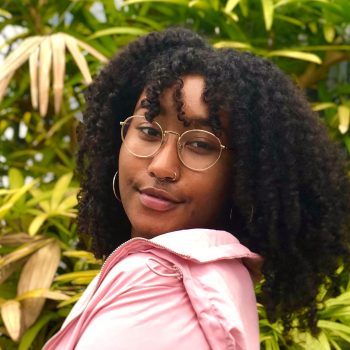Livingstone Undergraduate Research Award in the Social Sciences

Naomi Sanyika Moore

Development of the Student Sexual Health and Wellbeing Questionnaire
View Naomi's project online
My research project, the Development of the Student Sexual and Wellbeing Questionnaire, focused on the development of a meaningful, relevant measure for sexual health and wellbeing that could provide insight into university students’ needs. In the development of my foundational definition for young adult sexual health and wellbeing, and the creation of the questionnaire, I consulted both published academic literature and a diverse group of peers and subject matter experts. My pilot study for this questionnaire identified notable trends in student sexual health and wellbeing that will help inform future sexual health resources and support projects on campus.
What is your major and expected year of graduation?
I am a Psychological Studies major, and I intend to graduate after this coming summer 2021 semester.
What inspired you to pursue your project?
While university can be an exciting opportunity for sexual exploration, many young adults come into this experience with inadequate or inconsistent sexual health education and knowledge, putting them at risk for negative sexual health outcomes. I discovered this reality first-hand, but also through hearing the experiences of my peers. International students at my school have a particularly difficult time learning about and supporting their sexual health. Not only do we come from varied educational backgrounds, but it is also difficult to navigate the sexual health resources in Japan, whether it be protection methods, testing, or access to trusted sex educators. The language barrier international students often face exacerbates an already limited access. This reality can have disastrous consequences—we are talking about college students within the highest risk group for common STIs being unaware or unable to access necessary sexual health care. Of course, these biomedical issues are only one part of the puzzle; I also heard of many instances of nonconsensual sexual contact, wherein the individual didn’t know either how to express consent or that their consent was even important. Sexual health and wellbeing are hugely important to me, so I wanted to do anything I could to support my peers and reduce the harm. Fortunately, universities can play an important role in providing resources that support students’ sexual health and wellbeing, however, this requires meaningful assessment of the students’ needs. Therefore, I wanted to pursue a project that could gather student data and provide a framework for using this data for actionable change.
What does winning this award mean to you?
The morning I read my award email, I literally jumped out of bed and squealed; I was genuinely stunned and amazed. I have struggled with imposter syndrome for much of my life. As a survivor of childhood abuse, believing my aptitude, curiosity, passion, and dedication as a student are genuinely defining of who I am has been a major obstacle and consequence of my conditioned self-invalidation. For many years, I have been working to transform this cognitive distortion; despite the struggle, I have tried my best to challenge and apply myself in service of my drive for self-growth and service of others. For me, this research award says, “You were right, the struggle was worth it. You are deeply passionate and capable, and people can see it. The praise of your impact is not an accident.” Vulnerability is a core tenant of my identity, so being able to honestly share the depth of this impact is as meaningful as the award itself. Furthermore, this award inspires me to hone my research skills, and to explore new opportunities for application. This past year has been devastating for so many students, and this award came at a crucial time of financial insecurity for me. It is a privilege to be able to use this award to support my tuition in my final semester at Temple University, Japan Campus, and I look forward to completing my education with an emboldened confidence and thrill for my work.
How did the Libraries support your research?
Whenever I conduct a research project, I start with a literature review, and the online Temple University Libraries catalog is my primary resource for this process. I cannot overstate how important it is to have access to so many varied digital sources. This allows me to gather and evaluate a wide range of sources, which not only supports higher quality research, but also fulfills my excitement for “research rabbit holes.” My curious brain often takes the lead and inspires me to jump between many sources to build and expand my understanding. Without access to the Libraries, this process would be significantly more inaccessible (especially with limited physical access to facilities during the pandemic). Finally, I have thoroughly enjoyed my communication with the Libraries when I need a source that isn’t readily available via the catalog. The online library support has been incredibly supportive and responsive to my research needs, and for that I am eternally grateful.
Naomi’s project was driven by her desire to find a more diverse, less traditional, and inclusive conceptualization of sexual health literacy and to develop, as she often said, a way to expand a narrowly or traditionally defined construct. She approached her research on the topic from different perspectives and conducted interviews with experts to ensure the items in her questionnaire tapped on her conceptualization of the construct. Her project embodies a combination of perseverance, creativity, and wonderful research skills. It has been a pleasure to watch Naomi hone her research skills and become a very promising young researcher. Here at TUJ, we are all very proud of her accomplishment.
—Ada Angel, Associate Professor, Psychological Studies and Director of Writing, Temple University Japan
This award is generously sponsored by John H. Livingstone, SBM ’49.
